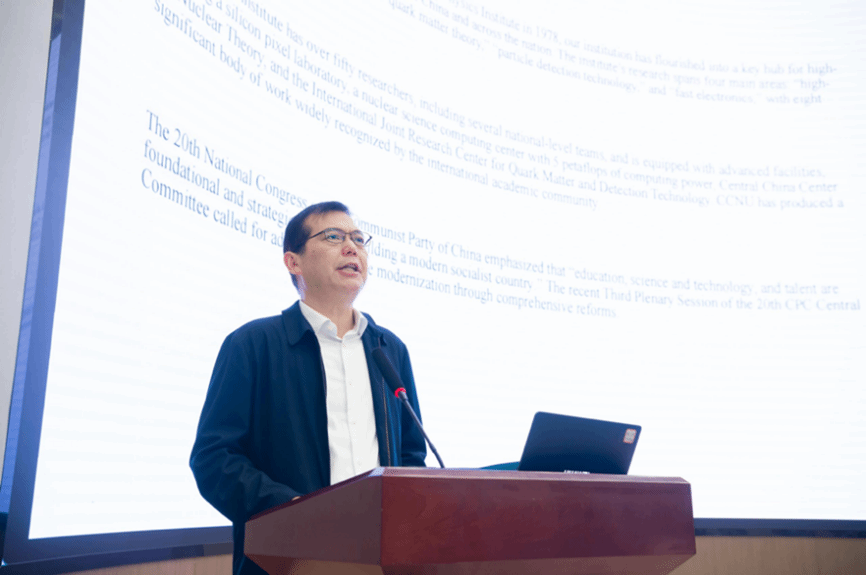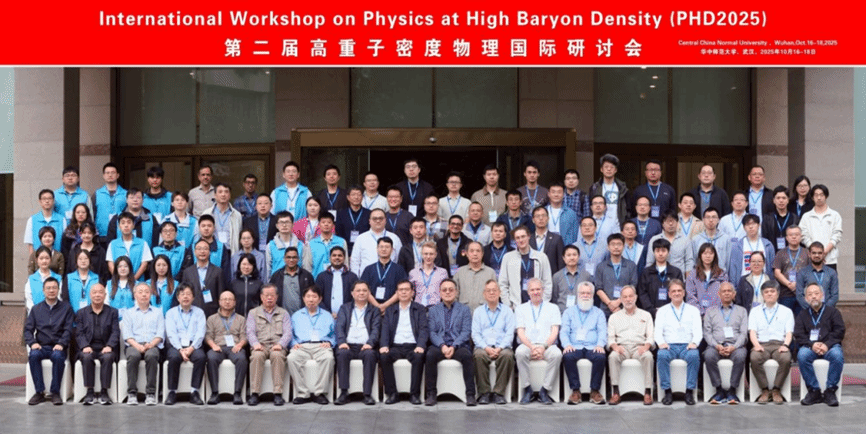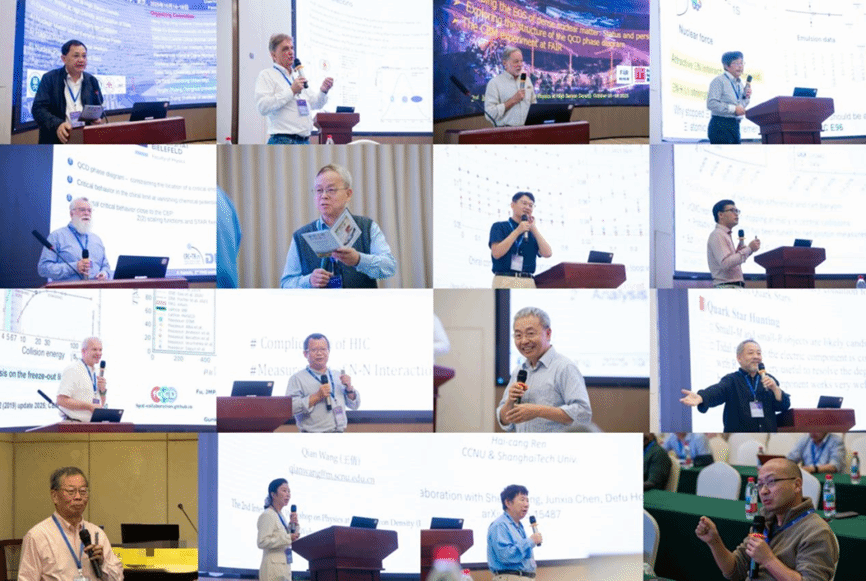From October 16 to 18, the 2nd Workshop on Physics at High Baryon Density (PHD2025) was successfully held at Guiyuan Hotel of Central China Normal University. The workshop was hosted by the School of Physical Science and Technology of Central China Normal University and co-organized by several leading domestic universities and research institutions, including Tsinghua University, Dalian University of Technology, Shanghai Jiao Tong University, Fudan University, University of Science and Technology of China, Shandong University, and the Institute of Modern Physics of the Chinese Academy of Sciences. The event brought together global expertise to explore cutting-edge research in the field of high baryon density physics.
At the opening ceremony, Chen Diming, Deputy Secretary of the Party Committee of Central China Normal University, attended and delivered a speech. On behalf of the university, he extended a warm welcome to the domestic and international guests who had traveled from afar and expressed his sincere congratulations on the successful opening of the workshop. Quoting the ancient saying, “Distance cannot separate true friends, even when they are thousands of miles apart,” he emphasized, “Science and technology are a shared cause for all humanity. Only by upholding the spirit of openness and cooperation can we continuously drive academic innovation and technological progress.”

Chen Diming, Deputy Secretary of the University Party Committee, delivered a speech
Deputy Secretary Chen Diming pointed out that significant achievements have been made in the construction of large-scale heavy-ion scientific facilities both domestically and internationally. The CBM experiment in Germany and the NICA facility in Russia are progressing steadily, while China’s Huizhou High-Intensity Heavy-Ion Accelerator project is also under active development. High baryon density physics has become a research hotspot in the international physics community. Exploration in this field not only deepens humanity’s understanding of natural laws but also expands the application prospects of disciplines such as nuclear physics and astrophysics. He noted that Central China Normal University has established a significant advantage in this field, becoming a key player in international competition and collaboration. The university will fully support the organization of this series of workshops, with the aim of further strengthening collaboration between domestic and international theoretical nuclear physics centers and laying a solid foundation for China’s high baryon density physics research to reach the global forefront.
As a high-level academic exchange event, the workshop focused on "key physical issues in the high baryon density region," addressing challenges and development opportunities in the field. It provided a platform for researchers from around the world to share ideas and achievements. The event attracted nearly 120 experts and scholars from multiple research institutions worldwide, who engaged in in-depth discussions on the latest advancements and future trends in high baryon density physics.
The workshop was co-chaired by Professor Luo Xiaofeng from Central China Normal University and Professor Zhuang Pengfei from Tsinghua University. It featured invited presentations by internationally renowned scholars, including Professor Frithjof Karsch from Bielefeld University in Germany, Professor Shinichi Esumi from the University of Tsukuba in Japan, Professor Peter Senger from the GSI Helmholtz Centre for Heavy Ion Research in Germany, Professor Jan M. Pawlowski from Heidelberg University in Germany, and Professor Joachim Stroth from Goethe University Frankfurt in Germany, as well as leading experts from domestic universities and research institutions. Participants engaged in lively and in-depth discussions on key scientific issues such as quantum chromodynamics (QCD) phase transitions in the high baryon density region, the equation of state of nuclear matter, and the dynamics of system evolution, demonstrating a rigorous and pragmatic academic attitude and an innovative research spirit.



Group Photo of the Workshop
 After three days of fruitful exchanges, the workshop concluded successfully in a friendly and collaborative atmosphere, highlighting the vibrant development of high-energy nuclear physics and injecting new momentum into global research in this field.
After three days of fruitful exchanges, the workshop concluded successfully in a friendly and collaborative atmosphere, highlighting the vibrant development of high-energy nuclear physics and injecting new momentum into global research in this field.
It is reported that Central China Normal University is one of the earliest institutions in China to conduct research in high-energy nuclear physics. Its Institute of Particle Physics has developed into a national hub for high-energy nuclear physics research. The university boasts several national and provincial-level research platforms, including the Ministry of Science and Technology International Joint Research Center for Quark Matter and Detection Technology, the Ministry of Education Key Laboratory of Quark and Lepton Physics, and the Hubei Provincial Engineering Research Center for Silicon Pixel Chips and Detection Technology. Leveraging its strong research foundation, the university’s high-energy physics research team has achieved multiple internationally leading results in the study of relativistic heavy-ion collision physics, such as the properties of quark-gluon plasma and the QCD phase structure, continuously contributing to the development of China’s high-energy physics discipline.